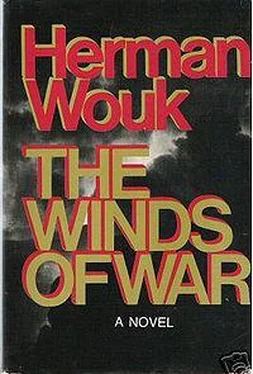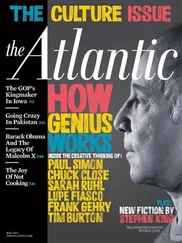Herman Wouk - The Winds of War
Здесь есть возможность читать онлайн «Herman Wouk - The Winds of War» весь текст электронной книги совершенно бесплатно (целиком полную версию без сокращений). В некоторых случаях можно слушать аудио, скачать через торрент в формате fb2 и присутствует краткое содержание. Год выпуска: 1971, Издательство: Collins, Жанр: Историческая проза, на английском языке. Описание произведения, (предисловие) а так же отзывы посетителей доступны на портале библиотеки ЛибКат.
- Название:The Winds of War
- Автор:
- Издательство:Collins
- Жанр:
- Год:1971
- ISBN:нет данных
- Рейтинг книги:4 / 5. Голосов: 1
-
Избранное:Добавить в избранное
- Отзывы:
-
Ваша оценка:
- 80
- 1
- 2
- 3
- 4
- 5
The Winds of War: краткое содержание, описание и аннотация
Предлагаем к чтению аннотацию, описание, краткое содержание или предисловие (зависит от того, что написал сам автор книги «The Winds of War»). Если вы не нашли необходимую информацию о книге — напишите в комментариях, мы постараемся отыскать её.
About the Author
Herman Wouk's acclaimed novels include the Pulitzer-Prize winning
;
;
;
;
;
; and
.
The Winds of War — читать онлайн бесплатно полную книгу (весь текст) целиком
Ниже представлен текст книги, разбитый по страницам. Система сохранения места последней прочитанной страницы, позволяет с удобством читать онлайн бесплатно книгу «The Winds of War», без необходимости каждый раз заново искать на чём Вы остановились. Поставьте закладку, и сможете в любой момент перейти на страницу, на которой закончили чтение.
Интервал:
Закладка:
“Well, I wasn’t on a looting expedition,” Natalie said. “Here, Byron. It’s beautiful. Give it to your girlfriend, or your sister, or your mother.”
“Keep it, it’s yours,” he said rudely. “I could consider staying in Warsaw and waiting for that girl to grow up.”
“Not with those parents,” Slote said. “She’s for a rabbi.”
“Steer clear of Jewish girls anyway, they’re bad joss,” Natalie said.
“Amen,” said Slote.
“Natalie was pinning the brooch on her jacket. “I guess I’ll see Berel in Medzice, then. Too bad, Aaron said he was very clever, and could show me things in Warsaw that nobody else could. They used to study the Talmud together, though Berel was much younger.”
At the mention of Medzice, Slote despairingly shook his head.
Chapter 8
Natalie telephoned Byron in his room at seven o’clock one morning, after they had stayed up till well past three, touring nightclubs with Slote; dismal Polish imitations of Paris dives. In a nervously merry mood, she had pushed them on from one club to another, ignoring Slote’s show of collapsing fatigue.
“Hi, Briny, are you dead?” From her chipper note, she might have had ten hours’ sleep. “This is playing sort of dirty, but I have two seats on the plane to Cracow, and it leaves at eleven. I bought them yesterday. If you’d rather sleep and just stay here, okay. I’ll be back in a couple of days.”
Half awake, Byron said, “What? Slote’s got us on the plane to Rome tomorrow, Natalie, and those reservations are mighty hard to come by.”
“I know. I’ll leave him a note. Maybe I’ll phone him from the airport. If you come, we won’t have to return to Warsaw at all. We’ll go straight on to Rome from Cracow, Saturday or Sunday, after I visit my family.”
“Have you got reservations from there?”
“No. But Cracow’s a hub. There are half a dozen ways to get out. We’ll buy our tickets — plane or train or bus — as soon as we arrive there. Well? Byron! Have you fallen back asleep?”
“I’m thinking.” Byron was weighing the advantage of leaving Warsaw and Slote, against these harebrained travel arrangements. The war crisis seemed to be abating. The Poles in the nightclubs had acted gay and carefree, though Slote had remarked on the absence of foreigners, especially Germans. The streets were as calm as ever, and there were no visible preparations for war. Byron had taken to gauging the state of the crisis by the tone of Radio Warsaw. He now knew a few key words and phrases about the crisis, and much could sometimes be surmised from the shaky or relieved accents of the newscasters. In the United States, announcers in a time of crisis tended to use sonorous doom-filled voices, to thrill their listeners. The Polish broadcasters, nearer the action, were less bent on being dramatic. In the past day or two they had not sounded quite so worried.
He said, “Have you heard any news?”
“I just got BBC on shortwave. Same bulletins as last night. Henderson’s talking to Hitler.”
“Natalie. This would be a damned wild excursion.”
“Why? I’ll probably never have another chance to see where my parents were born. I’m here now. Leslie himself said last night that the worst seems to be over, that they’ve agreed to negotiate. Anyway, you don’t have to come. I mean that. It’ll be a bore for you, slogging around in the Polish countryside.”
“Well. I’ll have breakfast with you.”
Byron packed fast. The more time he spent with Natalie Jastrow the more she puzzled him. Her relationship with Leslie Slote now baffled him too. If they were spending time in bed together — and he had to assume that this was part of her purpose in coming to Warsaw, if not all of it — they were finding odd hurried occasions for this, or taking pains to mislead him. Night after night Slote had said his farewells in the hotel lobby. She treated Slote, when they were together, with the loving warmth of a fiancée, yet when Byron tried to withdraw from their company — for dinner, for a concert or the theatre, even for a tour of the embassy — she made him come along. It had crossed his mind, of course, that she might be using him — perhaps had even asked him along to Warsaw — to provoke Slote. If so, the tactic was failing. The Foreign Service man was cordial to Byron and appeared to take his tagging along entirely for granted. But it was hard to tell anything about Slote, except that he was weary, swamped with work, and very concerned about Natalie’s presence in Poland.
There had been more to her persistence in the journey — that was becoming clear to Byron — than desire for her lover. The Jewish streets of Warsaw fascinated her. No matter where they started an evening, they ended in those narrow byways. She had even dragged Byron (Slote had begged off) to a performance of O’Neill’s Ah, Wilderness! at a little Yiddish theatre in a back alley, with a stage not twenty feet wide and a ragged curtain. For him, it was a bizarre and tedious experience. But the mixture of apple-pie American characters and stylized Jewish emoting in that shabby hall had much amused and moved her. “That was me, I guess,” she had said, coming out of the theatre into the warm night, in the muddy alley bordered with sagging half-timbered houses. “That exact strange mixture. I never quite understood that, and I’m still sorting it out. It’s disconcerting but exciting. Like seeing myself for the first time in a home movie.” Evidently this same fascination was drawing her to Medzice.
She was waiting for him in the restaurant. Somewhere she had bought a Polish dress, a bright flowery print with an open neck, and she had combed her heavy hair forward covering much of her forehead in an outdated American style, as the Warsaw women did.
“Will I get by? I’m so bored with all these stares, as though I had horns.”
“So long as you’ve got your passport handy, okay. Don’t go too native.”
“Oh sure, and there’s always this.” At her feet was a blue suede sack with drawstrings. “Suit, shirt, hat, stockings, girdle. I can go into a ladies’ room anytime and emerge a complete Amerikanka , full of indignation and waving dollars. Are you coming? No, of course.”
“Yes. My bag’s in the lobby.”
“Honestly? You’re as goofy as I am, Briny.” She looked at him from under her eyebrows, with a slow blink of her dark eyes, and Byron thought of the little ghetto girl in the lilac dress. “Tell me, don’t you like Slote a little better now?”
“I don’t dislike him. I’m sorry for him at the moment, he’s certainly in over his head.” The waitress put down plates of food. He said, “Well, you ordered for both of us. Fine. There’s nothing like this Polish ham.”
She said, “I’m even beginning to feel slightly guilty here, eating ham. Imagine! Natalie cut and ate the thick pink meat with no visible remorse.
“I don’t know anything about your religion,” Byron said.
“Neither do I, and it’s hardly my religion. I dropped it before I was eleven years old — temple, Hebrew classes, everything. It grieved my father: he’s a Zionist, an officer in the temple, and all that. But our rabbi was such a boring dunce, Briny! And my father simply couldn’t answer my questions. He’s not an intellectual like Aaron, he’s a businessman. When I was eleven I’d read more books than he had.”
“But he just allowed you to drop it?” Byron said. “Like that? My father wouldn’t have, that’s for sure.”
“Possibly military men are different,” Natalie said with a skeptical smile. “Most fathers can’t do much with daughters. Anyway, I was an only child, and very good, on the whole. I just wouldn’t keep up flummery that made no sense to me. Well!” She set her knife and fork down. “Coffee and then on to Medzice. Correct?”
Читать дальшеИнтервал:
Закладка:
Похожие книги на «The Winds of War»
Представляем Вашему вниманию похожие книги на «The Winds of War» списком для выбора. Мы отобрали схожую по названию и смыслу литературу в надежде предоставить читателям больше вариантов отыскать новые, интересные, ещё непрочитанные произведения.
Обсуждение, отзывы о книге «The Winds of War» и просто собственные мнения читателей. Оставьте ваши комментарии, напишите, что Вы думаете о произведении, его смысле или главных героях. Укажите что конкретно понравилось, а что нет, и почему Вы так считаете.












